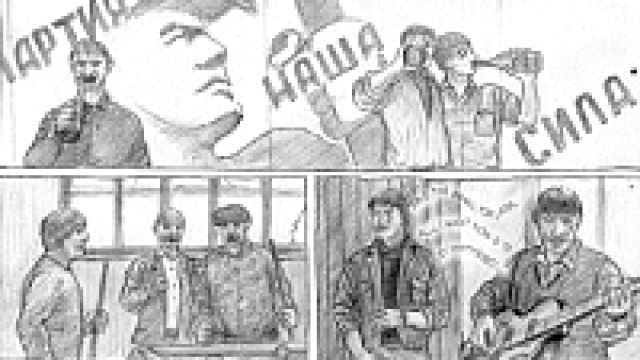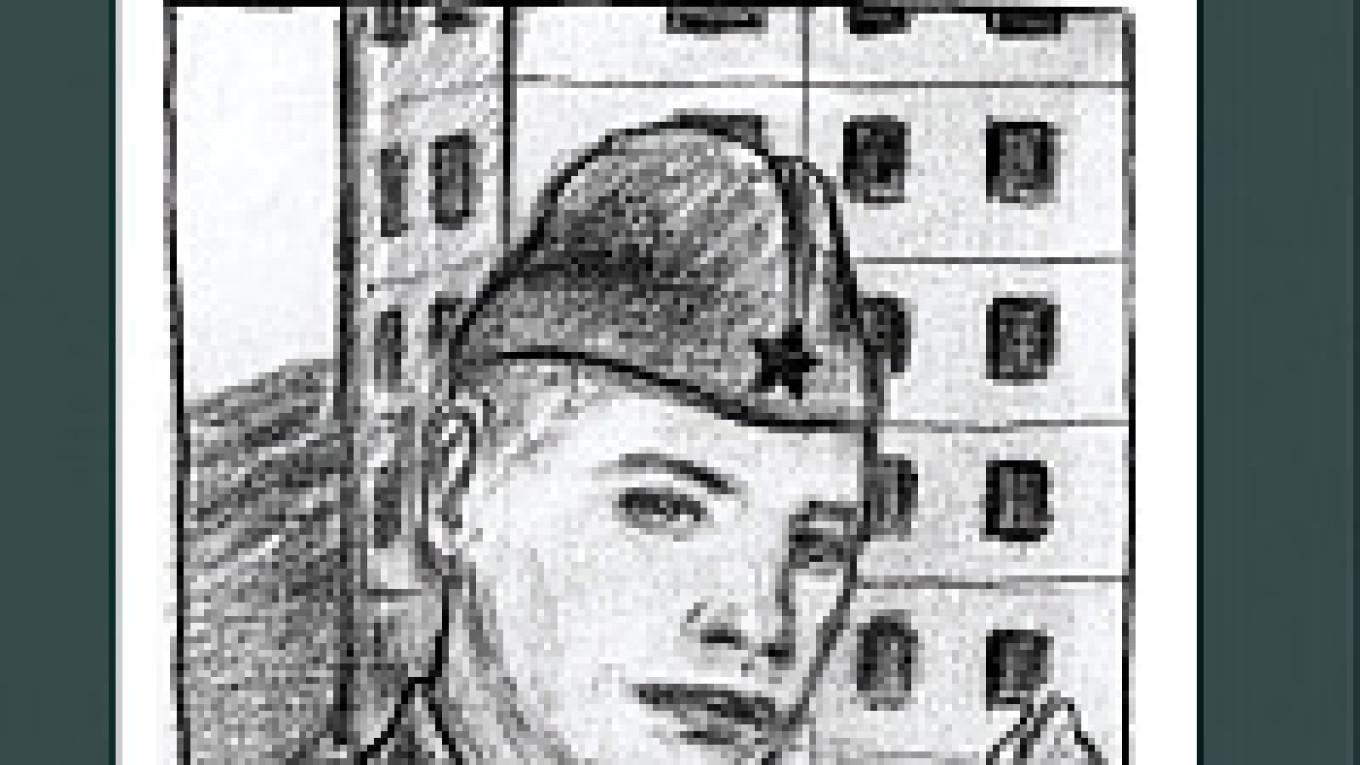Like the best memoirists, Maslov edits his own life effectively. In narrative and picture, this graphic novel contains almost nothing extraneous, no filler or padded material. Maslov presents his life with the spare, flickering intensity of a dream, and fittingly, he begins in his imagination: For the first two pages we see a teenage Nikolai in his log cabin in western Siberia, listening to a radio broadcast about France. The broadcast's questions -- "And what are they wearing on the Champs-Elysees today? What colors do Parisians like this season?" -- are so distant from Nikolai's life that they might as well concern another planet. Images of the Pont Neuf and booksellers on the Seine give way to the shabby expanse of rural Siberia.
Immediately thereafter -- before any biographical information other than his birthplace and family members -- Maslov announces his beginning as an artist. "Holding a pencil," he says, "I could see things I hadn't seen before. ... It was like Siberia had opened up a bit of its heart to me." The five drawings that accompany these words are stunning: monochromatic but rich, alive with light and contour. His admiration for Impressionist painters comes as no surprise: His drawings also blend line-swept vibrancy and an almost Japanese sense of motion. Throughout he succeeds more with landscapes than cityscapes, and more with either than with his people, who tend to be either angelic or grotesque, but never entirely human. Still, just as these forest-and-stream idylls show Western readers that Siberia is something more than an unvaried landscape of ice and snow, Maslov's grotesques speak to lives ravaged by alcohol (which first shows up on page 6; the last glasses are downed five pages from the end), frustration and suppressed rage. The instructor who lectures on the socialist artist's duty and says that "everything about man should be beautiful" is a gap-toothed ogre. The drinkers all have leers; the superior officers have perversely distended mouths; the older men Maslov respects -- his father, a no-nonsense construction foreman -- have square heads and straight mouths, reifications of unbowed stoicism.
Similarly telling are the few appearances of Socialist Realist art: Nikolai drinks himself silly after a day's construction work in front of a mural proclaiming "The Party is Our Strength." He paints a propaganda poster extolling Soviet progress and goodness and then reveals how he staved off starvation with pilfered bread. This is in keeping with the rest of his education, which is riddled with bombast and hypocrisy. His elementary-school teacher rhapsodizes, "Thanks to the guidance of the Communist Party, we live in the world's richest country"; the political instructor on a Mongolian army base lionizes his "nation of ardent patriots, savants and proletarians, talented inventors" -- a litany the officers repeat that night while toasting with homemade spirits; entry to the painters' union belongs to well-connected students rather than talented artists. Maslov presents these blowhards mercilessly, but without cynicism or rancor: He seems more an observer than a true believer, and in his Dante-esque journey he remains an even-tempered, welcoming guide.
 Soft Skull Press | |
If the army disillusioned him a bit, we see stirrings of deeper questioning just after his dismissal. During a break from construction work in Siberia, he remembers an incident from his youth, when he and some friends went swimming in a river and came upon some human bones on the riverside. An older peasant recalls mass shootings in the area during the 1920s, and says that "the earth has been spitting [bones] up for years. She doesn't want them, poor thing." Maslov then wonders, "How many Russians rotted here, vanishing without a trace? And for what?" This recollection, like a select few others in the book, has more than a whiff of convenient fiction, for what little that matters. It also shows Maslov's stoic bewilderment to great effect: The simple questions "How many" and "For what" cut to the bone more effectively than any amount of pontification or wallowing. The amount of prosaic tragedy in Maslov's life will probably stun most Western readers, yet as the author himself has said, "This graphic novel is nasty, very nasty, but it is the reflection of my life. ... My story is neither the most violent, nor the most tragic."
What makes this book worthwhile is less the violence and tragedy than the way Maslov passes through them, with understated defiance and hard-earned wisdom. The book ends with a series of dreams he had during his breakdown, and all of them -- traditional Russian bread ovens rolling across Red Square in place of tanks, the onion domes of St. Basil's Cathedral floating off as the building morphs into pine trees -- speak of a longing for home and quiet. "In a country where people agree to be flies," he says, having emerged from his hospital and found work as a building superintendent, "isn't it true that life is a spider web, always trembling with the slightest wind? I couldn't, and I wouldn't, accept that." "Siberia" is a refusal to accept life first as a cog in the Soviet machine and then as a forgotten citizen of the cash-obsessed kleptocracy that Russia has become. In its narrative's honesty and the deceptively simple vibrancy of its draftsmanship, it testifies to the worth of any single examined life.
Jon Fasman is the author of the novel "The Geographer's Library," a former online editor for The Economist, and writes about books, food and travel.
A Message from The Moscow Times:
Dear readers,
We are facing unprecedented challenges. Russia's Prosecutor General's Office has designated The Moscow Times as an "undesirable" organization, criminalizing our work and putting our staff at risk of prosecution. This follows our earlier unjust labeling as a "foreign agent."
These actions are direct attempts to silence independent journalism in Russia. The authorities claim our work "discredits the decisions of the Russian leadership." We see things differently: we strive to provide accurate, unbiased reporting on Russia.
We, the journalists of The Moscow Times, refuse to be silenced. But to continue our work, we need your help.
Your support, no matter how small, makes a world of difference. If you can, please support us monthly starting from just $2. It's quick to set up, and every contribution makes a significant impact.
By supporting The Moscow Times, you're defending open, independent journalism in the face of repression. Thank you for standing with us.
Remind me later.


